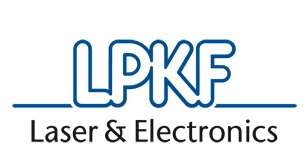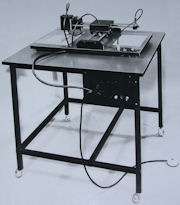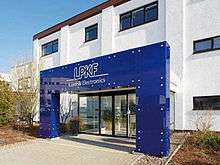LPKF Laser & Electronics
 | |
| Public | |
| Traded as | FWB: LPK |
| Industry | Electronics Manufacturing |
| Founded | 1976 |
| Headquarters | Garbsen, Germany |
| Products | PCB Prototyping Equipment, Laser Plastic Welding, Laser Direct Structuring for 3D circuits, SMT Stencil Laser, Laser Systems for Thin-film Solar Panels, Laser Cutting of Flex Circuits, Laser Depaneling of PCB. |
| Revenue | € 91.1 million (2016)[1] |
Number of employees | 700 Worldwide (2016)[2] |
| Website | LPKF.com |
LPKF Laser & Electronics AG is a highly specialized mechanical engineering company. It designs and manufactures laser systems. A typical application for these systems is in the production of electronic components. Since these components need to be built into smaller and more compact devices – such as smartphones – the utilization of high-precision laser beams as tools is becoming increasingly relevant. LPKF has pioneered the use of lasers in micro material processing. Since its formation in 1976, the Company has created entirely new markets with its innovative ideas. Today, technology from LPKF is deployed in a wide range of industries – such as in the electronics sector, where LPKF systems are used to design or separate circuit boards. The automotive industry uses LPKF lasers for particulate-free welding of sensors or taillights. Solar cell manufacturers boost the efficiency of their modules by deploying LPKF laser scribers. Most recently, LPKF started offering a laser-based glass processing method for microelectronics. And a digital printing process for functional pastes has been added to the LPKF portfolio in 2016. In many areas, the superior precision offered by laser technology is replacing traditional techniques, thus paving the way for more intelligent, digital production. LPKF has used its knowledge and experience in the field of laser technology to acquire leadership in all of its markets. This is why the Company invests around 10% of its revenue into research and development every single year. LPKF is headquartered in Garbsen near Hannover, Germany. The Company maintains a broad-based global presence, with a workforce of 700 based at sites in Europe, Asia and the US. The export share was around 86% in the 2016 financial year. The shares of LPKF Laser & Electronics AG are listed on the Prime Standard segment of Deutsche Börse.
History

Established in 1976 in Garbsen, Germany, LPKF made a name for itself with its unorthodox procedures for the in-house manufacturing of prototype Printed Circuit Boards (PCBs). The company’s CAD-steered milling technology was established as an efficient and pollution free alternative to chemical etching.[3]
LPKF stands for "Leiterplatten Kopier Fräsen"[4] translated "circuit board copy milling". This was created from the original LPKF machines. These simple manual machines used a pointer to follow a sketch, the milling head would move in the same direction and a footswitch was responsible for the up and down movement of the milling head.
Since its inception, LPKF has grown into an internationally operated company and is considered one of the world market leaders for in-house prototyping and stencil laser services.
Timeline


1975 - Juergen Seebach, one of the founders of LPKF, develops and patents a method for accurate mechanical milling of printed circuit board artwork.
1976 - LPKF System Seebach GmbH is incorporated in Hanover, Germany. The company’s first prototyping system, LPKF 39, is introduced.
1983 - LPKF introduces ColorCAM, its first IBM PC-based software for the computer-aided manufacturing of printed circuit boards with milling and drilling machines.
1984 – LPKF establishes its first international branch in the United States
1989 - LPKF develops a procedure for laser-based structuring of printed circuit boards.[5] The company name is changed to LPKF CAD/CAM System GmbH to reflect the increase activity in the CAD software.
1991 - LPKF forms a joint venture with 5 engineers from the Technical University Illmenau. The new company is named LPKF Motion & Control GmbH and focuses on developing precision x/y motion systems.
1994 - LPKF opens a new production facility in Slovenia.
1998 - The company name is changed to LPKF Laser & Electronics AG to reflect greater involvement in laser technology. LPKF goes public in November 1998 and is listed on the Frankfurt Stock Exchange “Neuer Markt” segment.
2000 - LPKF Tianjin CO. Ltd. is established as a new subsidiary in China. LPKF purchases a stake in LaserQuipment AG, which produces and distributes systems for Laser plastic welding.
2001 - LPKF introduces the MicroLine laser systems for drilling and structuring printed circuit boards.
2006 - The LPKF-LDS process is used in the series production of three-dimensional Molded Interconnect Devices (MIDs)[6]
2007 - LPKF SolarQuipment GmbH develops and produces laser systems for the structuring of thin film solar cells. LaserQuipment AG becomes fully consolidated and is now operating as a division of LPKF.[7]
2009 - LDS technology for 3-dimensional circuits 6[8] is becoming most widely used for manufacturing smart phone antennas.
2010 - LPKF wins the prestigious Hermes Award at the Hannover Messe[9] for its Fusion 3D laser system for 3D circuit manufacturing.
2012 - LPKF is admitted to TecDAX, the index comprising the 30 leading German technology stocks.
Board of Directors
The company’s board of managing directors consists of Dr. Ingo Bretthauer (Chairman and CEO), Bernd Lange (CTO), Kai Bentz (CFO) and Dr. Christian Bieniek (COO).[10]
Products
LPKF offers a broad range of products that cover the complete operational sequence for in-house prototyping. Products include:
Rapid PCB Prototyping Technology: Systems for the production of PCBs and multilayer boards.
SMT Stencil Technology : Enables laser production of SMT Stencils and quality check with inspection systems.
PCB Processing Technology: Enables cutting and drilling of printed circuit boards (PCBs) for highest requirements.
PCB Depaneling Technology: Enables depaneling of printed circuit boards (PCBs) for highest requirements
Laser Direct Structuring (LDS): Enables laser structuring of circuit layouts on 3D injection molded parts.
Solar Cell Technology: Laser systems featuring fast and precise structuring of thin film solar cells.
Laser Plastic Welding: Innovative laser systems for plastic parts welding.
- Laser plastic welding resource center
Measuring Machines: Measuring machines for the inspection of microstructures and stencil quality control.
Precision Drives: Portal systems, measuring systems and precision drives.
References
- ↑ "Annual Report 2016" (PDF). LPKF.
- ↑
- ↑ LPKF Laser & Electronics, North America Archived 2011-07-15 at the Wayback Machine.. PCBCafe.com
- ↑ "LPKF Laser& Electronics Kursverlauf (short report)" (PDF). Dr. Kalliwoda:Research. 10 December 2007.
- ↑ Friedrichkeit, Hans (January 2006). "Hidden Champion: LPKF Laser & Electronics AG". CircuiTree Magazine. Archived from the original on 2011-07-08.
- ↑ Grande, Joseph A. (June 2005). "MIDs Make a Comeback". Plastics Technology.
- ↑ Deligio, Tony (November 1, 2007). "The Perfect Weld". Modern Plastics Worldwide.
- ↑ "Research Association Molded Interconnect Devices 3-D MID e.V". 3-D MID.de.
- ↑ "Deutsche Messe stages HERMES AWARD again". HannoverMesse.de. 8 February 2011.
- ↑ "LPKF Laser & Electronics Stock Information". Bloomberg BusinessWeek.